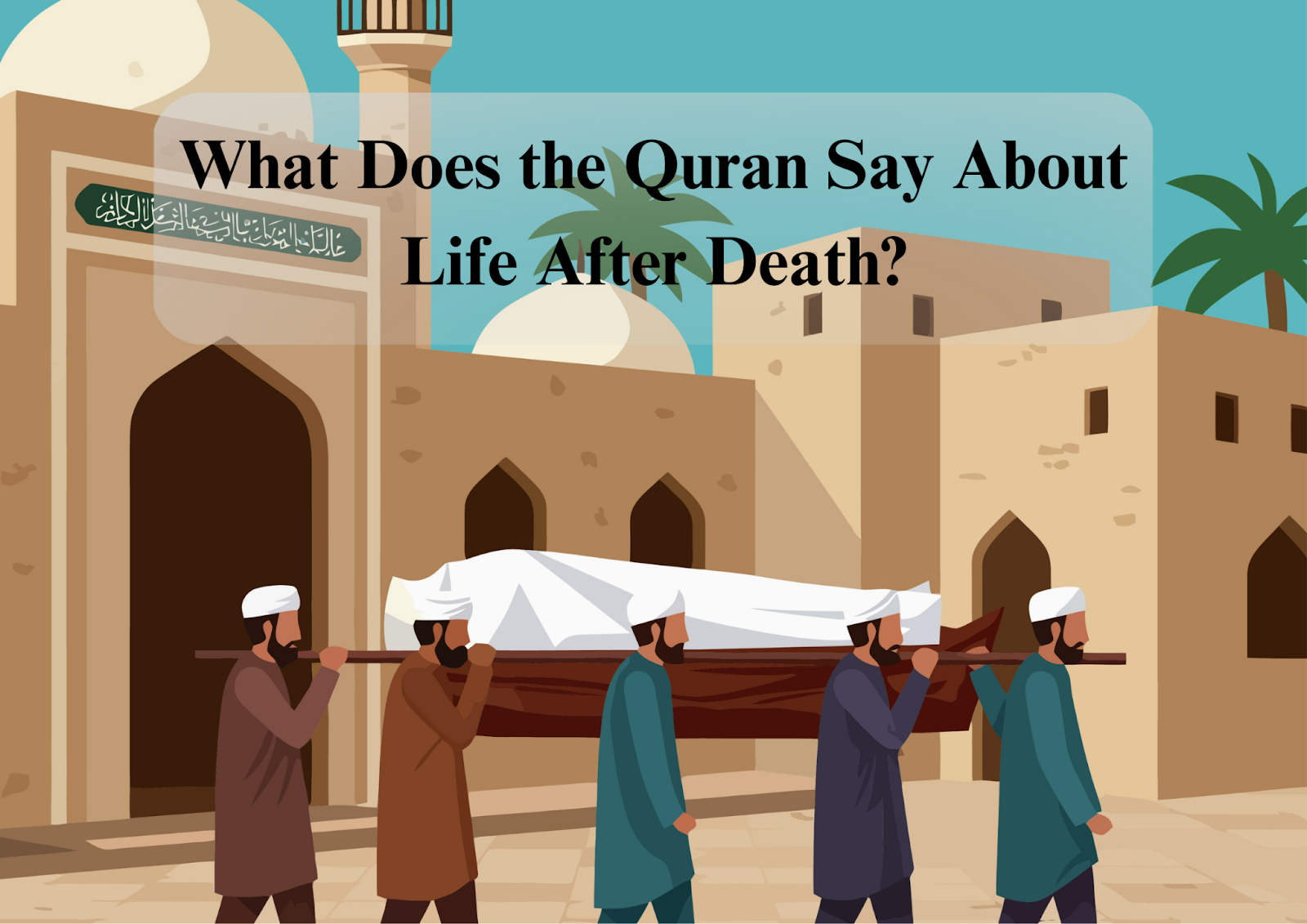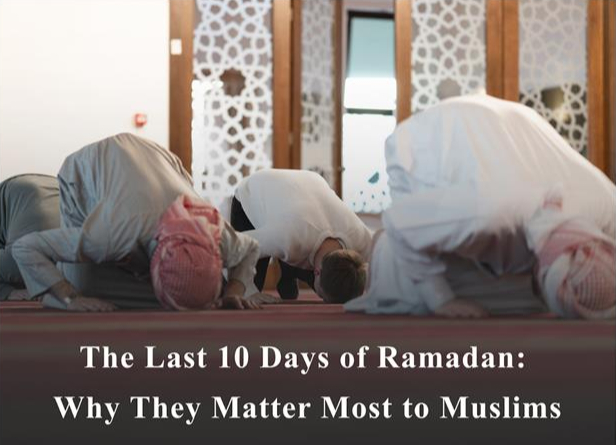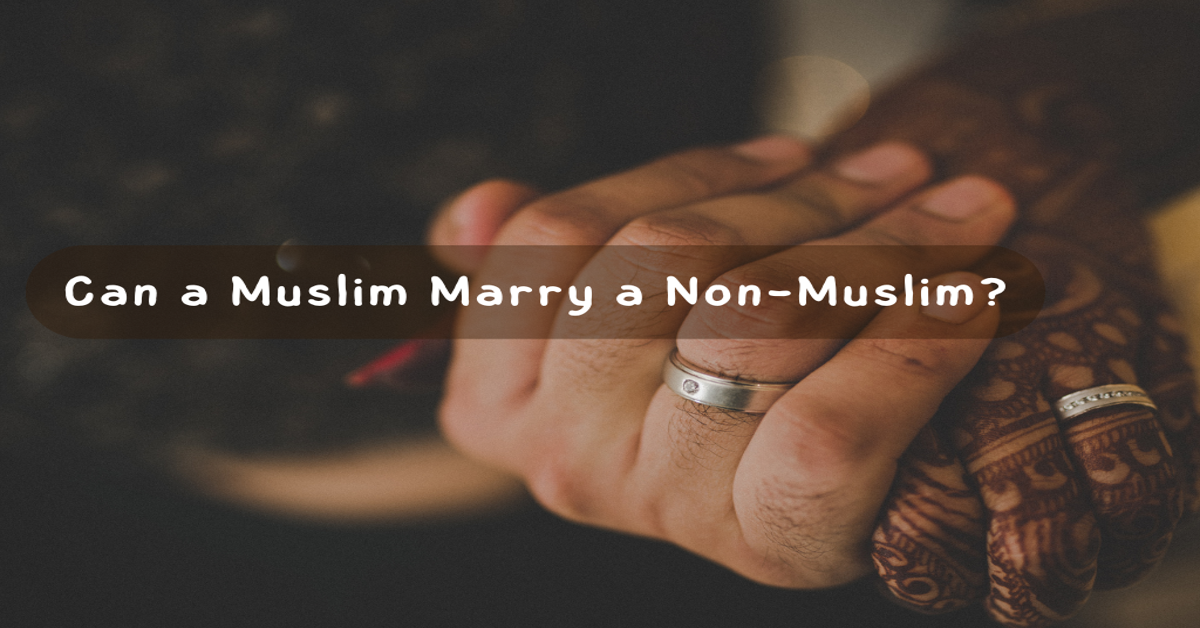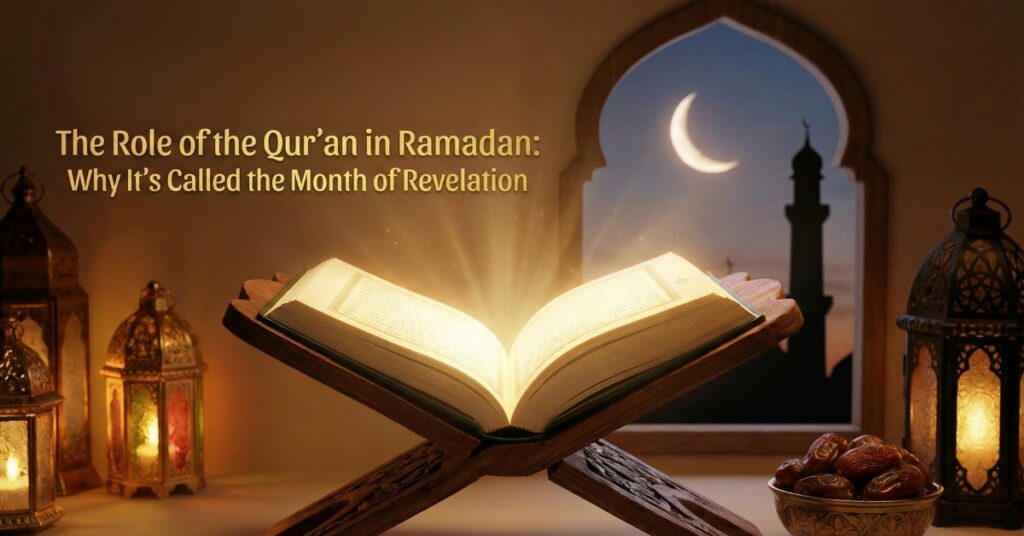The question of what happens after we die is one that has intrigued humanity for centuries. In Islam, the Quran life after death is not only affirmed but explained in detail, offering clarity, comfort, and accountability. Muslims believe that life does not end with death but transitions into another realm where every soul will be judged based on its deeds. This belief shapes Islamic values, ethics, and the way Muslims live their daily lives.
The Prophet Muhammad (peace be upon him) said, “ The deceased is followed to their grave by three things: family, wealth, deeds. The family and his wealth turn back and go home and his only companion that remains with him from now on is his collection of deeds. The deeds which he had committed in his life. Allah SWT says about the day of judgement in Quran itself clearly, “the Day when neither wealth nor children will be of any benefit.Only those who come before Allah with a pure heart ˹will be saved˺.˹On that Day˺ Paradise will be brought near to the God-fearing,and the Hellfire will be displayed to the deviant.” (Quran 26:88-91) From this point Your deeds are going to be your comfort and currency.
The Islamic Belief in Afterlife
The Islamic belief in the afterlife is rooted in the understanding that this world is temporary, and eternal life begins after death. The Quran repeatedly reminds humanity that worldly pleasures are fleeting compared to what lies ahead. Allah says:
“Every soul will taste death. And We test you ˹O humanity˺ with good and evil as a trial, then to Us you will ˹all˺ be returned.”
(Quran 21:35)
This verse highlights the inevitability of death and the reality of returning to Allah. The afterlife is seen as a continuation where justice will prevail, and no deed, big or small, goes unnoticed. We keep running behind the World, behind the trends, behind our worldly desires which are of no value in the afterlife. Instead one should never ignore what goes with him or her to the Akhirah or afterlife which is their deeds.
Abu Sa’id reported God’s messenger as saying, “Ninety-nine dragons will be given power over an infidel (non-believer) in his grave, and will bite and sting him till the last hour comes. If one of those dragons were to breathe over the earth, it would bring forth no green thing.” [Mishkat al-Masabih 134]. Each dragon is like 70 serpents with 7 heads, stinging the person until the day of judgement.
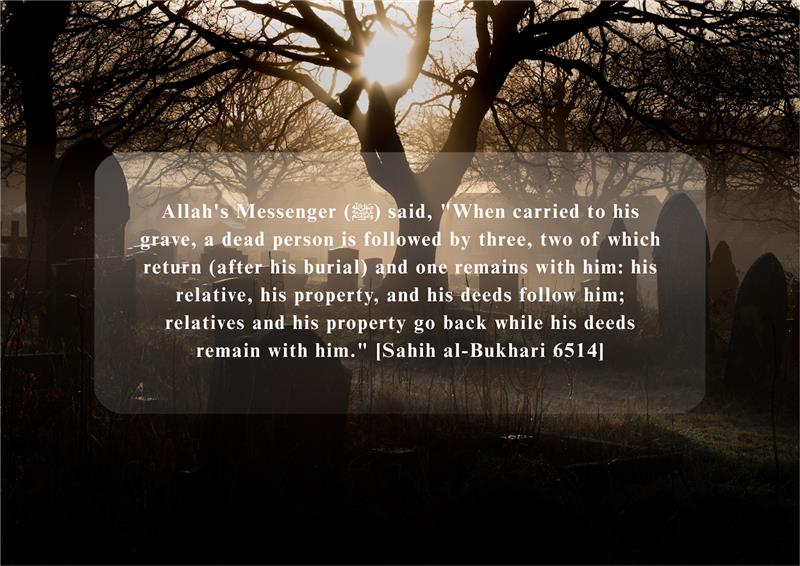
Resurrection in Islam
One of the central teachings of the Quran life after death is the resurrection in Islam. A person goes down into the grave after the soul has gone and they are in their grave. Can we imagine what will happen with that individual there? The grave will start narrowing or squeezing. How is it going to be narrow? Allah knows, but it’s going to happen as our prophet explained to us about the tightening and narrowing of the grave.
The Prophet (ﷺ) said, “When a human being is laid in his grave and his companions return and he even hears their foot steps, two angels come to him and make him sit and ask him: What did you use to say about this man, Muhammad ? He will say: I testify that he is Allah’s slave and His Apostle. Then it will be said to him, ‘Look at your place in the Hell-Fire. Allah has given you a place in Paradise instead of it.’ ” The Prophet (ﷺ) added, “The dead person will see both his places. But a non-believer or a hypocrite will say to the angels, ‘I do not know, but I used to say what the people used to say! It will be said to him, ‘Neither did you know nor did you take the guidance (by reciting the Qur’an).’ Then he will be hit with an iron hammer between his two ears, and he will cry and that cry will be heard by whatever approaches him except human beings and jinns.” [ Sahih al-Bukhari 1338]
The Quran emphasizes that all human beings will be raised again on the Day of Judgment. Allah says:
“And they argue with us—forgetting they were created—saying, “Who will give life to decayed bones? “ Say, ˹O Prophet,˺ “They will be revived by the One Who produced them the first time , for He has ˹perfect˺ knowledge of every created being.” (Quran 36:77–79)
This shows the certainty of resurrection, reminding humanity that the One who created life in the first place can easily recreate it.
Day of Judgment in Islam
According to Islamic eschatology, the Day of Judgment in Islam is the moment when all people will be held accountable. In reference to the Quran and Hadith, it will occur after resurrection, when all human beings are raised from their graves and brought before Allah for accountability.
Here’s where it fits in the stages:
- Grave (Barzakh) – Life between death and resurrection.
- Resurrection – All souls are brought back to life.
- Day of Judgment (Islam) – Every person stands before Allah, their deeds weighed on the scales of justice, and judgment is passed.
- Heaven or Hell – Eternal destination based on one’s deeds and faith.
The Quran paints vivid imagery of this day:
“When the earth is shaken ˹in˺ its ultimate quaking, and when the earth throws out ˹all˺ its contents, and humanity cries, “What is wrong with it?”— on that Day the earth will recount everything, having been inspired by your Lord ˹to do so˺.” (Quran 99:1–5)
The Prophet Muhammad (peace be upon him) further explained in Hadith: “The feet of a servant will not move on the Day of Judgment until he is asked about his life and how he spent it, his knowledge and how he acted upon it, his wealth and how he earned and spent it, and his body and how he used it.” (Tirmidhi)
This highlights the seriousness of accountability. Also all our activities which are prohibited in the Quran will never go unnoticed, so fear Allah and his punishment. Fear the grave, fear the day of judgement. All our good deeds will be weighed against all our bad deeds. The true believer who has always feared Allah will have the good deeds weighing more than his wrong deeds, which will lead him towards paradise or Jannah. If it’s vice versa the Hellfire is awaiting us, the punishment from Allah is waiting for us.
Heaven and Hell in Islam
The Quran describes in detail the ultimate destinations — Heaven (Jannah) and Hell (Jahannum). Heaven and hell in Islam are not symbolic but real and eternal.
- Heaven (Jannah):
“Indeed, the righteous will be amid Gardens and rivers, at the Seat of Honour in the presence of the Most Powerful Sovereign.”
(Quran 54:54–55)
Paradise is described as eternal bliss, with gardens beneath which rivers flow, free from pain, sadness, or fear. The bounties of heaven have no limits and are never ending.
- Hell (Jahannum):
“As for the disbelievers, they will have the Fire of Hell, where they will not be ˹allowed to be˺ finished by death, nor will its torment be lightened for them. This is how We reward every ˹stubborn˺ disbeliever.There they will be ˹fervently˺ screaming, “Our Lord! Take us out ˹and send us back˺. We will do good, unlike what we used to do.” ˹They will be told,˺ “Did We not give you lives long enough so that whoever wanted to be mindful could have done so? And the warner came to you. So taste ˹the punishment˺, for the wrongdoers have no helper.”
(Quran 35:36,37)
Hell is depicted as a place of punishment for those who rejected faith and committed injustice.
Quranic Verses About Afterlife
The Quranic verses about afterlife are numerous and serve as reminders of accountability. A few notable verses include:
- They will be presented before your Lord in rows, ˹and the deniers will be told,˺ “You have surely returned to Us ˹all alone˺ as We created you the first time, although you ˹always˺ claimed that We would never appoint a time for your return.” (Quran 18:48)
- Whoever does an atom’s weight of good will see it, and whoever does an atom’s weight of evil will see it. (Quran 99:7–8)
These verses emphasize justice and the weighing of deeds.
Prophetic Teachings About Life After Death
Prophet Muhammad (peace be upon him) frequently reminded his followers of the afterlife to encourage righteous living. He said:
“The intelligent person is the one who controls himself and works for what is after death, and the incapable is the one who follows his desires and merely hopes in Allah.” (Ibn Majah)
This Hadith underscores the importance of preparing for eternal life instead of being consumed by temporary pleasures.
Conclusion
The Quran life after death provides a clear and detailed roadmap about what lies beyond this world. The teachings remind believers of the purpose of life, the reality of accountability, and the eternal rewards or punishments awaiting every soul. For Muslims, this belief is not abstract but deeply ingrained in daily actions, prayers, and choices. The promise of Paradise motivates goodness, while the warning of Hell deters wrongdoing. Ultimately, the Quran and Hadith emphasize that preparing for the afterlife is the true success of human existence.
Upon death, we don’t simply drift into peaceful unconsciousness—instead, our souls become fully conscious, experiencing either profound comfort or intense discomfort, a direct reflection of our earthly deeds. In Barzakh, our lives continue in a unique form: we worship, interact, and dwell alongside other souls, awaiting together the ultimate Day of Judgment. It’s a powerful reminder to reflect deeply on our actions, knowing that our true journey begins not when we close our eyes, but when we finally open them to eternity.
What does the Quran say about resurrection in Islam?
The Quran affirms that Allah, who created life initially, will resurrect all beings on the Day of Judgment.
How does Islam describe heaven and hell?
Heaven is eternal bliss with peace and rewards, while Hell is eternal punishment for disbelief and injustice.
Are there Quranic verses about afterlife?
Yes, verses like
Quran 21:35: “Every soul will taste death. And We test you ˹O humanity˺ with good and evil as a trial, then to Us you will ˹all˺ be returned.”
Quran 99:7–8: “Whoever does an atom’s weight of good will see it, and whoever does an atom’s weight of evil will see it”
Quran 36:77–79:“Who will give life to decayed bones? “ Say, ˹O Prophet,˺ “They will be revived by the One Who produced them the first time , for He has ˹perfect˺ knowledge of every created being.” clearly describe life after death.
What is the Day of Judgment in Islam?
It is the final day when all human beings will be resurrected, judged by Allah, and held accountable for their deeds.

